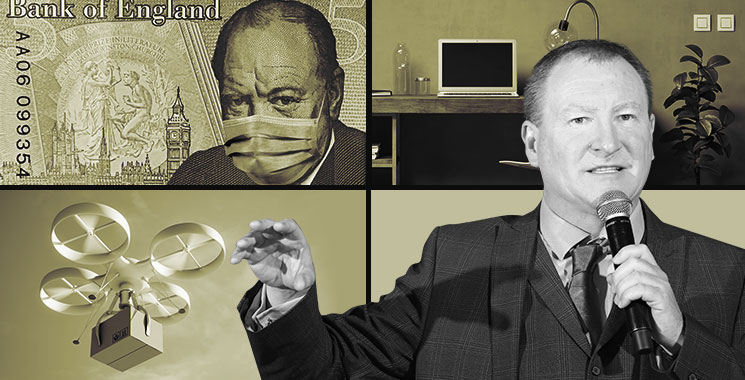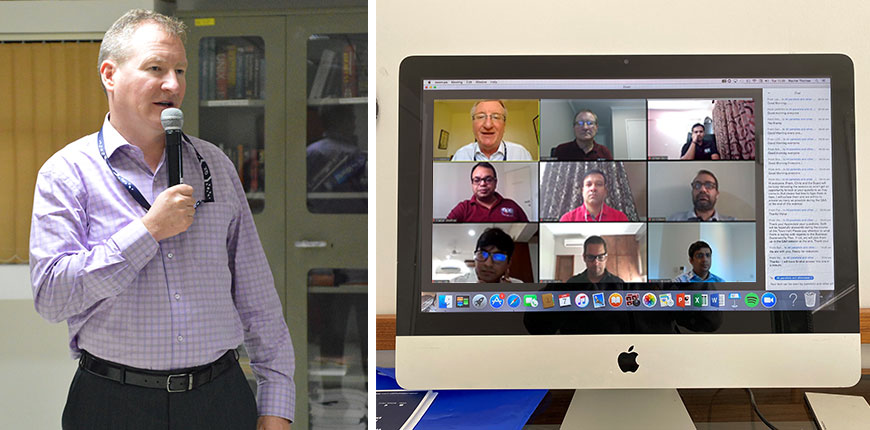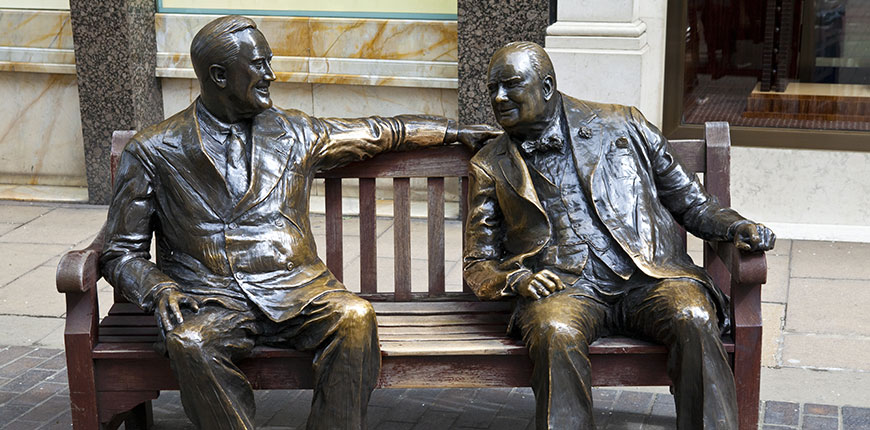Topics:
The Anatomy of Crisis Leadership: The Power of Boosting Employee Morale
Posted on May 04, 2020
Written By Chrisrobinson

The literature of crisis is rich, and in our own hour of slow-motion but indisputably real panic, there’s utility in revisiting these to see what kind of leadership exists at the heart of our recovery from a pandemic.
In 1930s, most of England was faced with a dangerous dilemma of either submitting to Nazi Germany or fighting through the Second World War, despite being weaker in forces. Except for one man who thought this was indeed “Their Finest Hour”: Prime Minister, Winston Churchill.
Churchill was stubborn, hard headed and strikingly confident. He visited areas that were bombed, delivered inspiring speeches, sought financial support from America, distributed optimistic propaganda and came out to be one of the greatest war leaders in history. In no time, his confidence spread like contagion and the Englishmen were sure of victory in the war– despite shortages in war arsenal. On dissecting Churchill’s political moves, one will find that he was a master in the art of raising the morale of the public.
Why Is Keeping Up Morale a Priority?
As leaders during the Coronavirus crisis, boosting your employees’ morale is where the road to recovery often begins. And if we were to dig deeper, we’ll find boosting one’s own morale and developing a growth mind-set is the starting point of any business contingency measure in a crisis.
But giving people a hope and a cause to believe in isn’t simple. Building morale is technical, delicate and I think of it as a craft that requires self-reform. Morale in the time of a crisis serves as cohesive force between employees, before a crisis like COVID-19 triggers a desperate scramble among them.
We’re also fighting through our own nervousness. Unlike Churchill, not all of us are as stubborn or even borderline delusional, when we’re making losses in business, experiencing uncertainty while still being asked to give ample hope to keep an organisation running. We stumble and so did I in my decades of entrepreneurial career but there are some lessons in building morale that are evergreen – from Churchill’s time to mine – and I have distilled them into the following four for boosting one’s own morale and the people you lead through any crisis.
The Art of Slowing Down
“While our first instinct would be to act, we’re asked to do nothing but wait, while carrying the weight of the whole world on our shoulders.”

Mumbai, a city of 18.4 million people and the home of one of QX’s five branch offices in India, lies deserted on account of India’s ongoing lockdown
We are now dealing with two different contagions – the virus and the emotions it brings in. Whether we feel overwhelmed, anxious, frustrated, fearful or a compounding sense of doom – our negative emotions all linked to our lack of control over this crisis.
I have a little bit of a Darwinian outlook on this – our primitive instinct to counter a crisis is by going into our survival mode. In other words, as animals of evolution, we like to take action by ensuring the protection of ourselves and our loved ones.
However, the tragic yet unique nature of this pandemic has stripped us of our survival instincts. We’re required to isolate ourselves, wait with bated breath, brood on all possible outcomes about our financial security, our health, and the safety of our loves ones – including the future of a drained out world, recovering after a pandemic. While our first instinct would be to act, we’re asked to do nothing but wait, while carrying the weight of the whole world on our shoulders.
To counter helplessness, we end up overworking, making poor rash decisions and leading to disheartening outcomes. We fall into vicious cycles of exhausting ourselves. We forget that as leaders, what we need to understand is that sometimes slowing down is the best way to deal with a new crisis, by learning from new data and reflecting on it; rather than reacting from a tweet or a headline.
And if you, like me, are feeling too fidgety to wait – use this time to work toward acquiring skills that are needed in the COVID crisis. I noticed that as remote working kicked in, the loss of personal connections became more apparent in my company. As a leader in a crisis, this is where I stepped in to address the crisis, acknowledge the stress and fear and take the QX culture online by reinforcing camaraderie, self-esteem, assurance and compassion through digital platforms. Digital leadership was not in the job description of my generation but it is a critical skill for all of us to learn, gain confidence, assurance and feel safe during this rapidly developing crisis.
Go By The Numbers: The Probable and The Possible
“We’re living in a time when the internet has upended the power dynamics a leader used to have.”

Before and After Images of the QX Offices in Ahmedabad, India that lie empty ever since work-from-home began.
I am an accountant by profession and so are over 750 of my employees and 350 of my clients in the UK and the USA. Accountants have an acquired skill of going by the numbers and calculating what’s probable and what’s possible.
A possible scenario is a worst scenario outcome – years of economic slump, massive worldwide death tolls and social distancing lasting for a year. But a probable scenario predicts an outcome based off the current developments – including the recovery numbers and slow flattening of the curve. So what’s probable is what our economists are telling us:
- A massive rise in economic activity, just as in the aftermath of World War II
- The realisation that our current level of economic activity is unsustainable and unnecessary.
- The needlessness of long commutes to work
- A reduction in our carbon footprint
- A vaccine for curbing the future outbreaks of the disease
Having lived through SARS and H1N1, I have seen that pandemics can catalyse social change. It certainly is a “breakthrough moment” for people of my generation, who are finally comprehending the good, bad and ugly of digital media. What makes a pandemic into panic is rumours – with governments and social groups raising public awareness about fake news, misinformation and sensationalism mongering on social media – I vet twice before mass-forwarding a dubious treatment for notching up one’s immunity.
We’re living in a time when the internet has upended the power dynamics a leader used to have. It can do both – lift up our spirits by giving us a platform to connect with our loved ones or lower our morale by constant inundation of unsettling updates that leave us feeling helpless.
Communicating Through the Dark
“A leader must appeal to the logical reasoning of employees by backing it up with data, predictions and why drastic changes like a pay cut is a logical choice in current circumstances to ensure financial security in the future”

Robinson’s monthly townhall rituals have now moved to a weekly webinar session with employees. They are conducted by Robinson and QX’s board members.
With an emphasis on transparency and some Aristotelian techniques of rhetoric, I think effective crisis communication can upend predictions in even the times of low Morale. The common factor between Winston Churchill, social activists and viral content marketers is that they all use rhetoric to make people believe in their visions or cause.
However, it is quite ironic how in crisis, communication becomes a touchy subject for most corporate leaders. Especially when communicating updates on pay cuts, furloughing or big unwelcomed decisions. Like clockwork, these announcement get followed by questions that most leaders may not have answers to.
But the history of powerful war-time communication teaches us how effective communication is the key to building morale:
1. Crafting Rhetoric: For centuries leaders have used Aristotle’s modes of persuasion: logos, ethos and pathos to appeal to the larger audience and make them believe in their vision when communicating through speech or writing.
Logos : For example, when announcing a drastic crisis management measure like a pay cut, a leader must appeal to the logical reasoning of employees by backing it up with data, predictions and why a drastic change like a pay-cut could be logical choice in current circumstances to ensure financial security in the future. This gives them a sense of empowerment and an optimistic approach to the changes.
Pathos: Addressing the prevalent emotions of fear and financial stress and showing how a pay cut will build hope in your employees and faith in a leader’s management measures to fight through.
Ethos: It’s an appeal to credibility and why people should trust in a leader. For founders and top corporate executives who’ve given years to organisations, your employees might already have faith in your credibility as a leader. You can remind them of your accomplishments and breakthroughs in the past.
2. Transparency and Regularity: Instead of forwarding long messages by health professionals or lawyers, leaders should step up as the source of credible, honest and reliable sources of information. Providing timely updates to clients and employees about not just breakthroughs but also near-term challenges. Transparency always leads to higher morale in crisis.
3. Comparisons: Reminding the audience of past experiences that produced desired results is a good way to reinforce confidence. It supports your claims and makes everything you say more believable
This is what Churchill did to further strengthen the hope that Britain would win the war. He reminded the British people of what happened in World War I when the Allied Powers managed to win the war against all odds.
A Growth Mindset: The Morale of a Leader in Crisis
“We’ve always dissected leaders during a crisis – carefully observing their crisis management plans. But for some reason, one fails to measure the morale in those who are led, including ourselves, because we refuse to take accountability as leaders.”

The Churchill and Roosevelt Allies Sculpture at Mayfair, London, regarded as the symbol of the victory in World War II against the seemingly undefeatable Armed Forces.
What is a Leader, anyway? Throughout my career, I’ve seen the theory of leadership become a dangerous obsession in politics and in business. Life coaches, entertainment and self-help publishing industry made some great profit out of it – selling every success story as a new theory of becoming a “true leader.”
We forget that leaders are often born out of their response to a crisis. Not just a personal crisis but one where many are at stake. John F. Kennedy averted the Cuban Missile Crisis with facts, levelling out communication with public and informed decision making whereas Harold Wilson took a rather rash decision to devalue the pound in 1967, causing an economic depression for years in England.
My decades of experience in navigating through leadership theories tell me that one thing that’s even more contagious than the gripping coronavirus is a growth mindset. Most leaders who had a breakthrough in popularity, stability and boosting morale in public possessed a growth mindset.
Lately “The Growth Mindset” has become quite a business in corporate, making its way into mission statements and vision boards but I find that most people have limited understanding of it. A growth mind-set refers to an individual’s belief in their acquired talents developed through hard work, good strategies, and input from others whereas, its counterpart, a fixed mind-set exists in leaders who believe their talents are innate gifts.
Fostering the growth mind-set helps in boosting employee morale by using more than just lofty values of “transformation” and “innovation.” Encouraging appropriate risk-taking, rewarding not just effort but learning and progress and even some failed attempts in the right direction.
For example, I often recommend it to my peers and clients in the industry who had mergers, events in play during this time are knowing coping with the crushed hopes of cancellations. I advise them to re-strategise: use this time to re-evaluate their event plans, reflect on business’ past practices and use this time to develop strategies – instead of brooding on delays.
One reason why the growth mind-set is often clouded with fixed mind-set in challenges like the COVID crisis is because we fall into defensiveness, insecurity and fear. It strips employees away from growth behaviours like sharing information, collaborating, innovating, seeking feedback, or admitting errors.
I think of a growth mind-set in work culture as a perfect weapon to counter fear, unproductivity and vicious cycles of inconsequential work.
The Verdict on Crisis Leadership
We’ve always dissected leaders during crisis – carefully observing their crisis management plans – in our unending quest to find loopholes or success tropes and mapping out predictions about our futures from the anatomy of their leadership styles. But for some reason, one fails to measure the morale in those who are led, including ourselves, because we refuse to take accountability as leaders or the ones responsible for boosting the morale of our peers, loved ones and at times, of our frontline leaders too.
To some extent, most of us are leaders in this crisis – inside and outside of work. I consider each one of my clients and 1,300 employees as leaders, who are involved in making informed decisions for ensuring the safety of the business, their family members and their communities. I think each one us have the responsibility of boosting the morale in others and sometimes, ourselves too. In truth, leaders work hard on lifting up morale in crisis to bring out more leaders like them to see through to victory. It’s not a cry for validation; it’s a reminder to relinquish control even in helplessness.
“We have before us an ordeal of the most grievous kind.
We have before us many, many long months of struggle and of suffering.
You ask, what is our policy?
I will say: It is to wage war with all our might
and with all the strength that God can give us. That is our policy.
You ask, what is our aim?
I can answer in one word: Victory.
Victory at all costs—Victory in spite of all terror—Victory,
however long and hard the road may be,
for without victory there is no survival.”
– An extract of Winston Churchill’s maiden speech as Prime Minister, 1940
Originally published May 04, 2020 12:05:03, updated Jul 24 2024
Topics:







